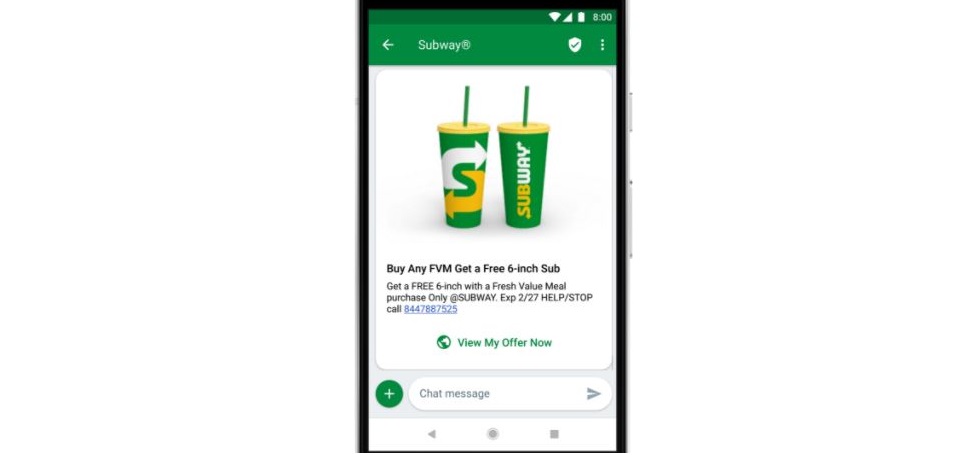Google-led successor to SMS is a boon for mobile operators
RCS, also known as Chat, will open up new opportunities for operators

The headlines at Mobile World Congress (MWC) earlier this year were dominated by new handsets, connected cars and 5G, so it’s not surprising that advances in Rich Communications Services (RCS) flew underneath the radar.
RCS is seen as a successor to SMS and supports rich media content, hot buttons and other features. It has strong support from mobile industry body the GSMA, which showcased the technology in its Innovation City at MWC.
SMS has barely developed since its inception, with MMS the only significant upgrade, so it’s not surprising the telecoms industry has yearned for something more as over the top (OTT) applications like WhatsApp, Skype and Facebook Messenger have gained in popularity and functionality.
But what is surprising is that Google, not the mobile operators, that’s spearheading development.
Google Chat
In an interview with The Verge last week, the man entrusted with leading Google’s efforts Anil Sabharwal revealed that the name for the consumer name for the platform will be ‘Chat’ and that the company is more or less ‘pausing’ development on other efforts like Allo and Duo after they failed to gain traction with users.
The idea is simple, rather than try and create its own proprietary system like WhatsApp or iMessage, Google is changing the universal messaging system itself.
Despite the fact WhatsApp and Facebook Messenger have more than a billion downloads, people still use SMS when they have to. And because they will nearly always go to the default messaging application to do this, it doesn’t make sense to create yet another new application.
Are you a pro? Subscribe to our newsletter
Sign up to the TechRadar Pro newsletter to get all the top news, opinion, features and guidance your business needs to succeed!
Google is working with more than 43 mobile operators and handset manufacturers around the world, including Huawei, LG, Motorola, Sony. It will also form part of the Android One and Google Pixel roadmap too. Since last year, it has been included in Android so it’s increasingly built into the default messaging application.
RCS rapid scale, ensures operator support, and means that the standard Android messaging application will be able to contact any device without the need for an app download. Instead, Google will layer its own functionality, such as Google Assistant, on top of the application.
“There are a lot of great messaging products and experiences that are out there,” Sabharwal told The Verge. “Just because Google may want to be one of them is not a reason for us to invest or build products. We fundamentally build products because we believe we can deliver better, improved user experiences.”
Operator support
Third party applications and intense competition are having a serious impact on traditional telecom revenues, meaning firms are looking for new sources of income wherever the can. RCS not only allows operators to give something new to consumers, but also allows them to sell new services to businesses.
It is aimed at organisations who want to engage with customers and attract new business, either through marketing campaigns or customer service operations. It would also allow a company like Uber to be able to better communicate with its users outside of the application. Other potential uses are credit card fraud alerts, flight status updates and package delivery notifications, so it’s not all about making a direct profit.
RCS has already been trialled in the US, with Booking.com and Subway among those who have tested it out. In the UK, British Gas, Foxtons and Pizza Hut Delivery have worked with IMImobile, while ITV is working with OpenMarket and Uber with Infobip.
Telefonica, Orange and Deutsche Telekom are among the major European operators to take an interest, while Vodafone – which powered the first ever SMS back in 1992 – has become the first to launch RCS A2P messaging on its network.
“The same features that make messaging more fun for consumers also offer an exciting opportunity for companies to deepen their engagement with their customers with branded messages,” declared Stefano Parisse, Vodafone Group director of product and services.
“To see how brands – and individuals – can best take advantage of this new channel, we’ve recently launched RCS business messaging trials.”
Vodafone said its small-scale trials which saw it advertise its V-Pet IoT product and another to raise awareness of its SecureNet security platform. Although limited, Vodafone said the campaigns delivered consistent click through rates of more than 25 times that of traditional SMS campaigns.
Future of RCS
The GSMA predicts that 86 percent of smartphones will be RCS-enabled by 2020 and the market could be worth as much as $74 billion. Of course, for RCS to snare more share, it would need to get Apple on-board, something it may be loathed to do given the traction of its iMessage platform.
But Google’s radical approach could pay dividends. WhatsApp has been trialling business-focused services for some time now, but this relies on it keeping its high install base. RCS gives businesses a chance to offer rich content without needing an app – either its own or someone elses – to communicate with customers.
It might not be as flashy as a new phone, but RCS could be one of the most significant changes to the mobile industry in some time.
- Check out the best mobile deals for April 2018
Steve McCaskill is TechRadar Pro's resident mobile industry expert, covering all aspects of the UK and global news, from operators to service providers and everything in between. He is a former editor of Silicon UK and journalist with over a decade's experience in the technology industry, writing about technology, in particular, telecoms, mobile and sports tech, sports, video games and media.